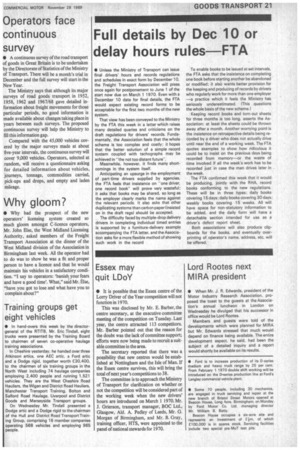Full details by Dec 10 or delay hours rules FTA
Page 23

If you've noticed an error in this article please click here to report it so we can fix it.
• Unless the Ministry of Transport can issue final drivers' hours and records regulations and schedules in exact form by December 10, the Freight Transport Association will press once again for postponement to June 1 of the Start now due on March 1 1970. Even with a December 10 date for final details, the FTA would expect existing record forms to be acceptable for the first two months of the new system.
That view has been conveyed to the Ministry by the FTA this week in a letter which raises many detailed queries and criticisms on the draft regulations for drivers' records. Fundamentally, the Association feels that the whole
scheme is too complex and costly; it hopes that the better solution of a simple record system coupled with tachographs may be achieved in -the not too distant future-.
Meanwhile, however, it finds many shortcomings in the system itself.
Anticipating an upsurge in the employment of part-time drivers supplied by agencies, the FTA feels that insistence on "one driver, one record book" will prove very wasteful: it asks that books may be shared, so long as the employer clearly marks the name against the relevant periods It also asks that other duplicating systems than carbon paper (insisted on in the draft regs) should be accepted.
The difficulty faced by multiple-drop delivery drivers in completing individual timed entries is supported by a furniture-delivery example accompanying the FTA letter, and the Association asks for a more flexible method of showing such work in the record To enable books to be issued at set intervals, the FTA asks that the insistence on completing one book before starting another be abandoned or modified; it also wants better provision for the keeping and producing of records by drivers who regularly work for more than one employer —a practice which it feels the Ministry has seriously underestimated. (This questions the whole basis of the new scheme.) Keeping record books and torn-out sheets for three months is too long, asserts the As sociation; at least the sheets could be thrown away after a month. Another worrying point is the insistence on retrospective details being re corded by a driver who does not actually drive until near the end of a working week. The FTA quotes examples to show how ridiculous it could be to insist on the previous days being recorded from memory—or the waste of time involved if all the week's work has to be recorded just in case the man drives later in the week.
The FTA confirmed this week that it would be producing, jointly with the R HA, record books conforming to the new regulations.
These will be in three types: daily books covering 15 days: daily books covering 30 days; weekly books covering 15 weeks. All will have space for non-statutory information to be added, and the daily form will have a detachable section intended for use as a driver's defect report sheet.
Both associations will also produce clipboards for the books, and eventually overprinting of operator's name, address, etc, will be offered.
















































































































